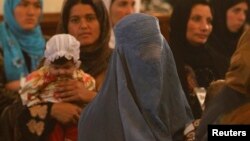ISLAMABAD —
Women in Afghanistan are increasingly worried about a return to the repressive policies of the past as international combat forces leave the country. Following years of outspoken activism, women are retreating into public silence to avoid being targeted by extremists.
Even after defiantly dropping the all-covering burqa following the fall of the Taliban government a decade ago, many women in Afghanistan now are reluctant to speak their mind on camera. Many women fear a family backlash, or worse, punishment by extremists in a highly conservative society.
Until recently, women activists were noticeably different.
But as international forces start to leave Afghanistan and uncertainty hovers over the country’s political future, women’s rights activists, female politicians and women leaders are being targeted more often.
Those defending women's rights are receiving death threats, said Susanne Baberg, Afghanistan project manager for Medica Mondiale, a women's rights advocacy group that works closely with Afghan activists. And they are coming under increasing pressure from their families to stop working.
"Given the current circumstances, it is not very advisable or popular to give public interviews, to go into debates on television, on radio, or in other media," Baberg said. "They are really trying to keep a very low profile, particularly if you take into account the threats and the assassinations of popular, active women in society in the last two, three months."
A high-ranking Afghan police woman died Monday after being shot by insurgents in southern Helmand province. Her predecessor was killed by unknown gunmen in July. The latest killing comes after a number of attacks on Afghan women lawmakers.
Baberg said the fallout from attacks on high-profile women is far-reaching.
"Besides keeping a low profile in the media, avoiding high level advocacy meetings, and varying routes on their way to work, our Afghan colleagues have ceased to visit their clients in their homes," she said. "They meet the women in different places in the community. Then community-level meetings with mullahs and village elders, which are part of several projects involving mediation and increasing the number of police women, are reduced to an absolute minimum."
U.N. High Commissioner for Human Rights Navi Pillay warned this week that human rights achievements in Afghanistan during the past 12 years were fragile. She expressed concern that the withdrawal of international combat forces could trigger a serious deterioration in human rights, especially regarding women.
“So then this is the moment for human rights to be strengthened, not weakened or sacrificed," Pillay said. "The Afghan government has made many statements proclaiming their commitment to strengthening human rights, which is reassuring, but action is needed now, more than ever."
Analysts say there are concerns that Afghan President Hamid Karzai and other political leaders may be willing to surrender ground on women's rights issues in order to gain support from more conservative and extremist elements on a negotiated settlement.
Pillay said in her discussions with Karzai, she emphasized that justice and human rights should not be sacrificed to political expediency.
Even after defiantly dropping the all-covering burqa following the fall of the Taliban government a decade ago, many women in Afghanistan now are reluctant to speak their mind on camera. Many women fear a family backlash, or worse, punishment by extremists in a highly conservative society.
Until recently, women activists were noticeably different.
But as international forces start to leave Afghanistan and uncertainty hovers over the country’s political future, women’s rights activists, female politicians and women leaders are being targeted more often.
Those defending women's rights are receiving death threats, said Susanne Baberg, Afghanistan project manager for Medica Mondiale, a women's rights advocacy group that works closely with Afghan activists. And they are coming under increasing pressure from their families to stop working.
"Given the current circumstances, it is not very advisable or popular to give public interviews, to go into debates on television, on radio, or in other media," Baberg said. "They are really trying to keep a very low profile, particularly if you take into account the threats and the assassinations of popular, active women in society in the last two, three months."
A high-ranking Afghan police woman died Monday after being shot by insurgents in southern Helmand province. Her predecessor was killed by unknown gunmen in July. The latest killing comes after a number of attacks on Afghan women lawmakers.
Baberg said the fallout from attacks on high-profile women is far-reaching.
"Besides keeping a low profile in the media, avoiding high level advocacy meetings, and varying routes on their way to work, our Afghan colleagues have ceased to visit their clients in their homes," she said. "They meet the women in different places in the community. Then community-level meetings with mullahs and village elders, which are part of several projects involving mediation and increasing the number of police women, are reduced to an absolute minimum."
U.N. High Commissioner for Human Rights Navi Pillay warned this week that human rights achievements in Afghanistan during the past 12 years were fragile. She expressed concern that the withdrawal of international combat forces could trigger a serious deterioration in human rights, especially regarding women.
“So then this is the moment for human rights to be strengthened, not weakened or sacrificed," Pillay said. "The Afghan government has made many statements proclaiming their commitment to strengthening human rights, which is reassuring, but action is needed now, more than ever."
Analysts say there are concerns that Afghan President Hamid Karzai and other political leaders may be willing to surrender ground on women's rights issues in order to gain support from more conservative and extremist elements on a negotiated settlement.
Pillay said in her discussions with Karzai, she emphasized that justice and human rights should not be sacrificed to political expediency.












